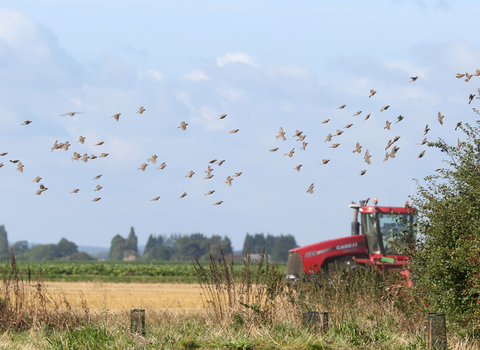The Bill represents a unique opportunity, certainly the biggest in my lifetime, to put in place the measures to help wildlife recover, at scale, across our countryside.
To do this it needs to:
- Have a clear purpose and objectives if it is to change the course of land management into a truly sustainable system.
- Include a duty to establish a new system of payments for public goods as well as a duty to ensure any interim funding for productivity is for sustainable production only.
- Establish legally-binding targets aligned with the future Environment Bill targets expressed through statutory Nature Recovery Plans towards which agriculture will contribute.
- Deliver long-term funding at the scale required to meet these targets and wider government stated ambition.
- Ensure a strong regulatory baseline is established and enforced.
I’ll look at each of these points in a bit more detail:
-
Defining the purpose of the Agriculture Bill
We believe that a broad purpose should be added to the Bill which clearly sets environmentally sustainable land management as an objective, and which is supported by the payment of public money primarily for the provision of public goods.
-
Payments for public goods and ensuring no environmental harm
The Wildlife Trusts welcome the focus on public goods in the Agriculture Bill’s accompanying policy statement; but the Bill contains no duty on the Government to make payments for public goods, nor to have an environmental land management scheme. The Bill therefore currently lags behind the Common Agricultural Policy, which requires Member States to have an agri-environment scheme and should be rectified.The Bill should also include a duty to ensure funding does not harm the environment.
-
Ambitious and legally binding targets for nature’s recovery
New legally binding targets are needed to guarantee the delivery of the Government’s ambition in its 25 Year Environment Plan for clean air and water, public access to high quality natural green spaces, healthy soils, connected and quality habitats and abundant wildlife including pollinators. The Agriculture Bill should require the Government to develop and set measurable environmental land management targets for these.
-
Long-term and sufficient funding
Crucial to the success of the Government’s proposed new Environmental Land Management system will be guaranteed long-term funding which is set at the level required to deliver its ambition to leave the environment in a better state for the next generation. Farmers need to be paid properly paid for managing their land to deliver public goods and agreed contracts may last from 5 to 15 years.
A report by The Wildlife Trusts, National Trust and RSPB found that at least £2.3 billion a year is required to ensure the UK meets it current environmental land management commitments. The Bill should therefore create a duty on the UK Government to routinely assess the scale of financial need and to allocate long-term funding in a way that ensures its ambition and targets are met.
-
Public investment targeted through Nature Recovery Maps
By taking a strategic and spatial approach to payments it will be possible to improve the state of our rivers, reduce flooding, join up habitats for wildlife and improve people’s access to nature. The delivery of the new Schemes should therefore be guided by statutory maps designed to drive the recovery of nature. These would map out where new areas of land for wildlife could be created through the countryside, alongside land used for food production - a Nature Recovery Network.
-
Regulatory baseline for all
The Agriculture Bill says little about regulation beyond the ability to establish an enforcement and inspection regime for new financial assistance payments. We would like to see the current review of Farm Inspections and Regulation inform the Agriculture Bill by proposing that it enshrines strong regulation for all - regardless of receipt of payments.
The Agriculture Bill also needs to work in harmony with other planned legislation, most notably a future Environment Bill that we believe must, amongst other things, legislate for:
- statutory targets for environmental recovery, including by statutory mapping of Nature Recovery Networks; and
- environmental principles by which our society should live.
The Second Reading of the Agriculture Bill takes place in Parliament on 10 October 2018.


